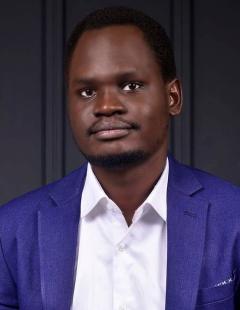Matai Muon
Tell us about your background
I am a South Sudanese national. Prior to joining Oxford, I was involved in a number of development programs, specifically working in the area of socioeconomic empowerment targeting South Sudanese women and youth residing in Nairobi, Kenya, for about two years. I was an interdisciplinary scholar having completed my undergraduate in International Studies at the University of Nairobi (Kenya).

“Its multi and interdisciplinary depth has allowed me to explore a variety of scholarship within the wider social science which was an important part of my decision to choose ODID.”
“Its multi and interdisciplinary depth has allowed me to explore a variety of scholarship within the wider social science which was an important part of my decision to choose ODID.”
What made you choose to study at ODID?
ODID defines development as a process of managed and unmanaged change in the Global South. I wanted to be part of that process. As an interdisciplinary scholar, I understand the process of change as multifaceted that appreciates many angles across the socioeconomic and political divides. I was fascinated by the opportunity to partake in that reality.
What do you particularly like about ODID?
It is very diverse from inside-out. ODID's diversity, I think, has affected how it frames and implements its policies. The administrative and teaching staff are very friendly. They make the rather difficult academic life easier at Oxford.
What do you particularly like about your course of study?
The MPhil in Development Studies is a true reflection of ODID. Its breadth is particularly fascinating. The field of development is wide and the MPhil has not disappointed me, and I believe my class cohort too. Its multi and interdisciplinary depth has allowed me to explore a variety of scholarship within the wider social science which was an important part of my decision to choose ODID, and Oxford, in general.
What did you research for your thesis?
My thesis seeks to understand petroleum policy-making in South Sudan. In particular, I am interested in the intersection of politics and policy within South Sudan's petroleum value chain by studying one of the primary documents – the local content regulations which aim to enable South Sudan to benefit from its natural wealth, which historically has been enjoyed outside its borders. The research seeks to understand how political and economic elites affect the implementation of this policy. It employs qualitative interview methods as well as documentary analysis to reveal further insights.
What other activities have you been involved with at Oxford?
Besides ODID classes, and lectures, I participated in a number of events both inside and outside Oxford. These included the Oxford African Conference and the World Bank Youth Summit both of which were held in May 2023. In addition, I served as the Black, Asian and Minority Ethnic representative (BAME) at my college, Brasenose for Michaelmas and Hilary terms – an opportunity that exposed me to the diversity and inclusion side of Oxford.
Is life at Oxford different from how you expected it?
Yes, it is. When I was going to Oxford, I imagined a very serious academic place with almost nothing else. But I was surprised to find that outside my residence at Park End Street are a number of bars and discos. I joined Oxford from Nairobi, a busy city with a lot of social life. I loved the finding. But the busy academic life at Oxford still stands, and would make one guilty the longer one takes outside the massive Oxford libraries.
What advice would you give to someone thinking of applying
Just apply. Oxford is looking for a talent, and you are that talent. You still need to think through life in Oxford though before submitting an application. I would make the Oxford website my best friend in the course of the application because it is extensive and quite detailed.
